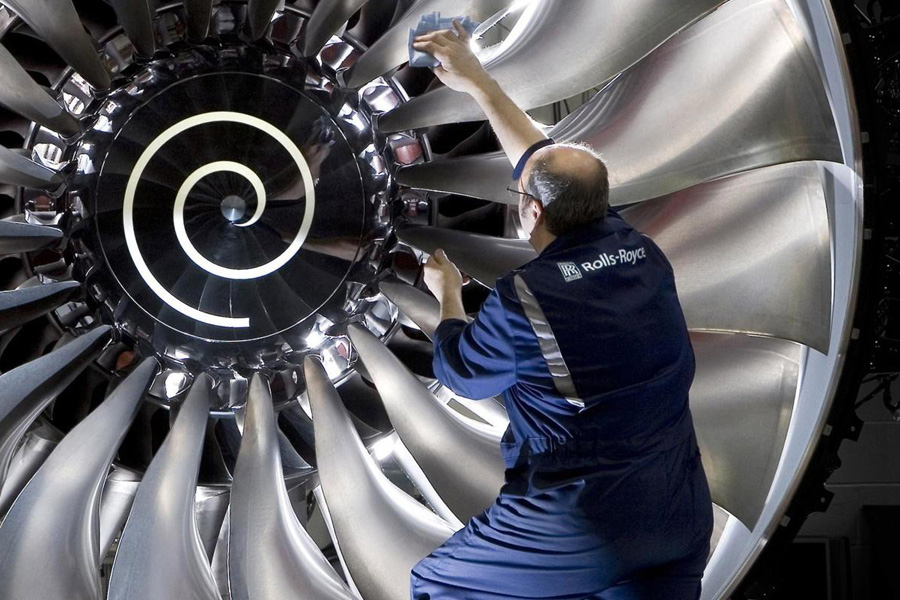
By Dr Joe Sanderson and Dr Chris Lonsdale, Department of Management
Over the past four years, we have been working with the production side of Rolls-Royce’s civil aerospace division (RR) on make-buy, procurement and contract management.. The key components of our work have been a series of research implementation events (termed ‘masterclasses’ by RR) and follow-up support activities.
The joint Birmingham/RR initiative had three main aims:
- To challenge existing ways of thinking and working, particularly on the part of managers in non-commercial roles.
- To apply new ways thinking, promoted by our research, to real business issues within RR.
- For a longer-term benefit, raise the competence levels of procurement managers, junior through to senior.
The ‘masterclasses’ we ran included research-led academic input (based on research with Emeritus Professor Andrew Cox and Professor Glyn Watson in the late-1990s to mid-2000s) which was then applied to real RR commercial issues during tailored group-work sessions. Strategies developed during and after the masterclasses were then submitted to various approval boards within RR. Since 2014, about 500 managers from different functions, seniority levels, supply chain units and countries have participated in a programme that has extended to over 100 days.
The linked support activities were an opportunity for specific business challenges and opportunities to be further explored by RR managers with our guidance. The focus of these events has been, for example, a new strategy for a supplier relationship (involving annual expenditure in excess of £100 million) and (with the help of Professor Glyn Watson) a major factory investment in Scotland and the North East.

No initiative of this type is ever going to go perfectly to plan – organisations are not like that. However, there is evidence that our contribution has assisted RR. A significant number of our ideas and models have been appearing in internal documents, strategies and reports. Alun Hughes, recently-retired Executive Vice President – Supply Chain Development, commented on this: “We have challenged our methodology and approach to some of the fundamental questions – make/buy, procurement and contract/relationship management. All have benefited and/or changed as a consequence.”
And, importantly of course, RR has reported improved commercial outcomes. Warren Taylor, a civil aerospace Purchasing Executive, has commented: “The most pleasing aspect is the impact on the organisation results overall. The level of contracting activity completed in 2015, for example, increased by over 25%. This improvement was not achieved by accepting worse positions or lowering quality. In fact, the level of contract quality has also dramatically improved, leading to an improved rate of ‘right first time”. By far the most visible and dramatic result, however, has been the reduction of external purchase cost for the “first time in many years”, and at a record level vis-a-vis the previous ten years. RR is not able to share specific numbers, but Warren Taylor states that this gain is recorded in multiples of £100 million.
In terms of the longer-term benefit of improved managerial competence levels, a key benefit has come from better cross-functional working. For example, RR were particularly keen to develop procurement manager and engineering manager relationships and cross-functional working. Progress towards this has been tracked in a quantitative survey in the last few months. The analysis (which is being prepared for journal submission) showed that communication within cross-functional teams has been significantly improved by masterclass participation. The comments of Luke Logan, Executive Vice-President-Engineering & Technology for civil aerospace, reflect this: “I am genuinely proud and grateful for the progress made with the masterclasses. With exemplary academic input, I have seen demonstrable positive change in our strategy and greater engagement levels from all stakeholders.”
The learning in this type of initiative goes both ways, of course. We have benefited from being in such close contact with an organisation that, like all players in aerospace, is facing enormous technological and commercial challenges. We have also seen certain business issues we have researched over the years play out in a different business context, which has helped us develop our thinking.
And, we have met some great people along the way.
